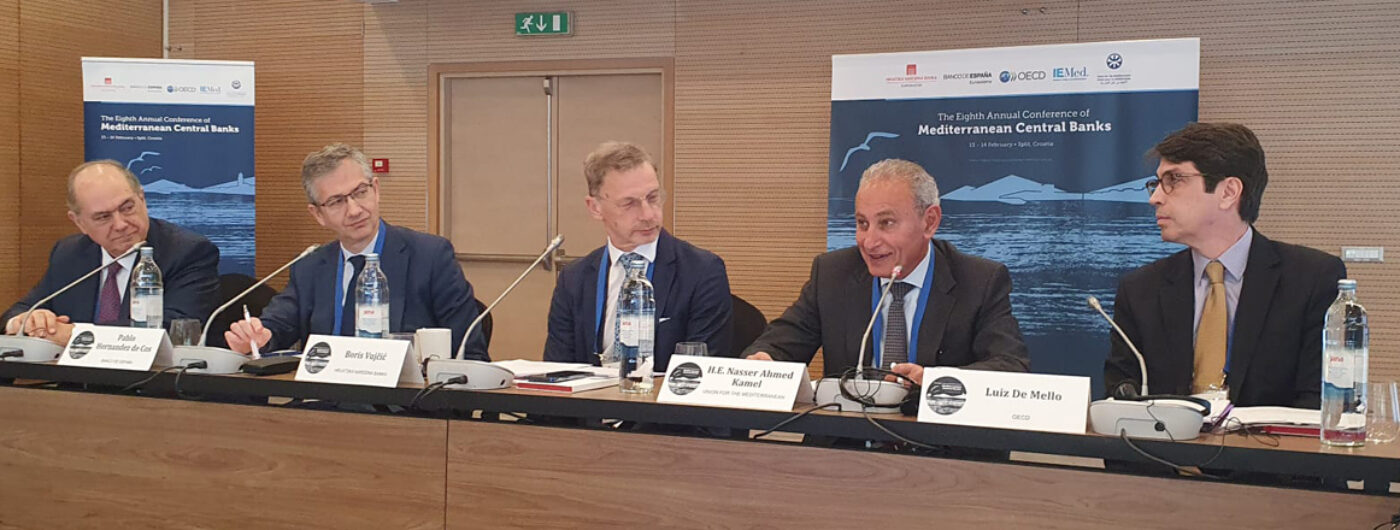
Bridging finance and sustainability: highlights from the 8th Central Banks Annual Conference
13-14 February 2024, Split, Croatia. – The UfM co-organised with the Croatian National Bank, the Banco de España, the Organization for Economic Cooperation and Development (OECD), the European Institute of the Mediterranean (IEMed), the 8th Annual Conference of Mediterranean Central Banks, which took place in Split, Croatia, on 13 and 14 February.
This conference served as a pivotal platform for the exchange of invaluable insights, the sharing of expertise, and the cultivation of cooperation among Central Bank Governors and other experts from the Mediterranean region. Nasser Kamel, Secretary General of the Union for the Mediterranean (UfM) delivered introductory remarks alongside Boris Vujčić, Governor, Hrvatska narodna banka Pablo Hernández de Cos, Governor, Banco de España, Senén Florensa, Executive President, European Institute of the Mediterranean (IEMed) and Luiz de Mello, Director of the Country Studies Branch, Economics Department, Organization for Economic Cooperation and Development (OECD).
Following the Opening session, the conference encompassed a wide array of subjects, starting with in-depth deliberations on the influence of the prevailing inflationary landscape on the credibility and policymaking strategies of central banks. The discussions not only scrutinized the immediate local impact but also delved into the global ramifications of the current inflation environment, providing a comprehensive understanding of the challenges faced by central banks worldwide. Moving forward, the discussions showcased groundbreaking initiatives aimed at fostering women’s economic participation and ensuring meaningful financial inclusion. This involved the spotlighting of innovative approaches and best practices that contribute to creating an enabling environment for women to access finance and actively engage in economic activities.
Moreover, the conference extended its focus to the critical theme of climate change and its intricate implications for the financial sector. Participants engaged in comprehensive discussions covering various aspects, including the assessment and supervision of climate risks by central banks and financial regulators. The discourse further explored the potential roles of these institutions in formulating effective climate change mitigation strategies for the financial system. Additionally, attention was dedicated to the vital topic of mobilizing green funding, essential for supporting adaptation efforts in the face of climate change challenges.
In order to achieve sustainable and inclusive societies in the Mediterranean region, it is imperative to involve banks and central banks in multistakeholder collaboration efforts. As key players in the financial ecosystem, banks and central banks possess substantial influence over economic policies, monetary frameworks, and financial regulations that directly impact societal development. Through partnerships with governments, civil society organisations, academia, and the private sector, banks and central banks can contribute to the design and implementation of policies and programmes that promote financial inclusion, support small and medium-sized enterprises (SMEs), foster job creation, and address socio-economic disparities.
Anchored to its efforts to promote sustainable and inclusive economic development in the region, the UfM will capitalize on the conclusions of this important event for the organization of its future activities including the 9th Annual Conference of Mediterranean Central Banks.

